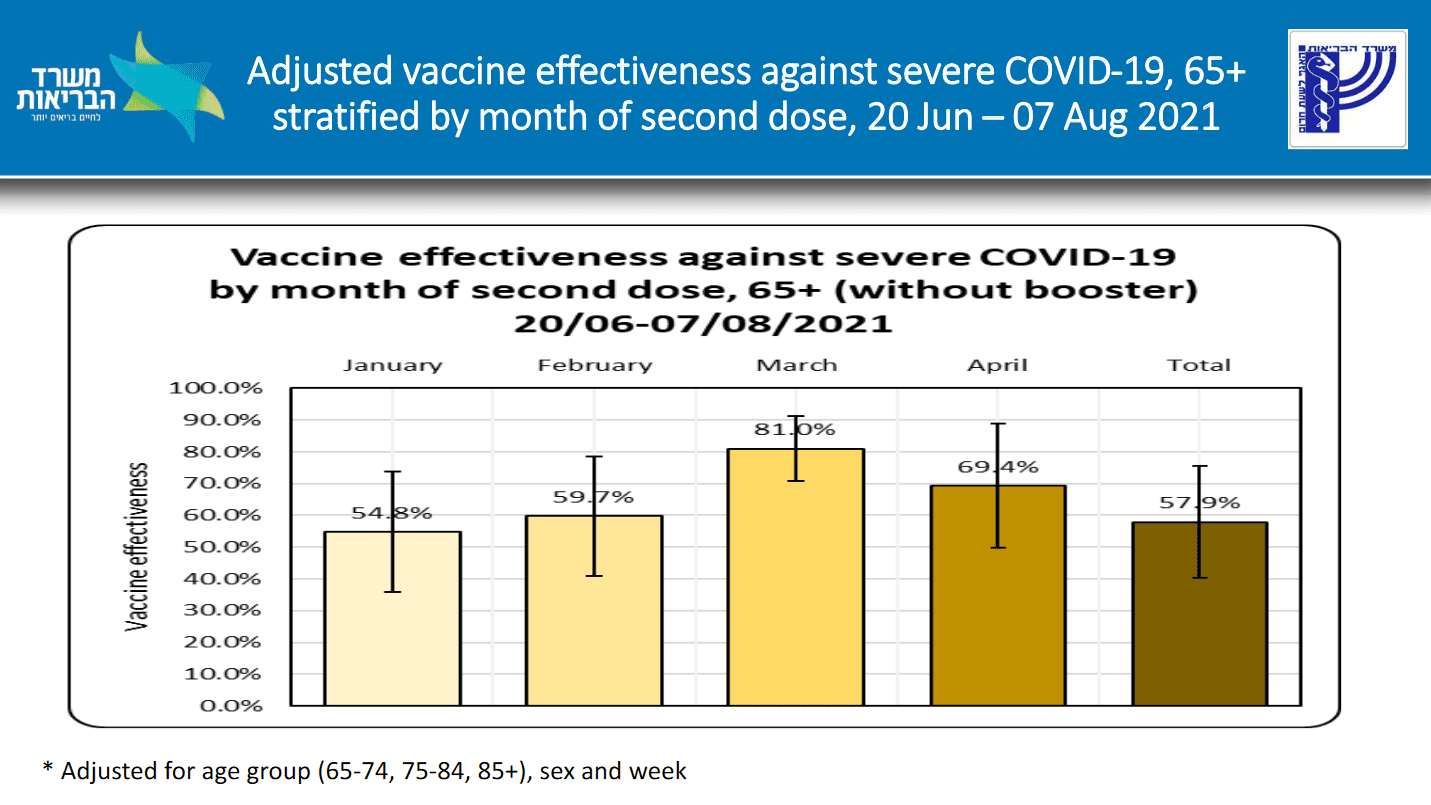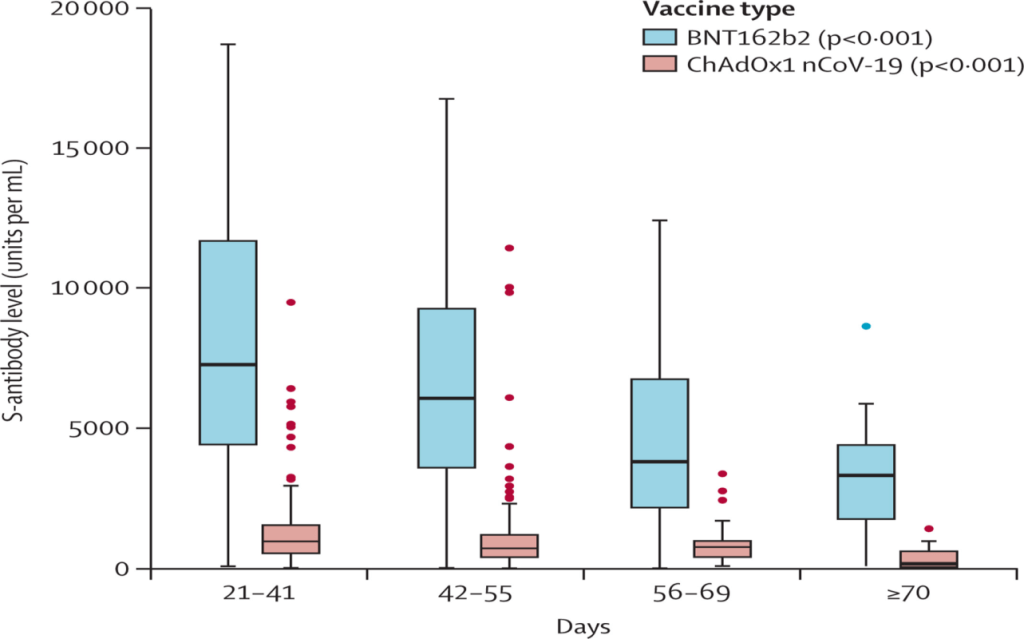
Covid Vaccines: A Shot in the Dark?

Published: August 20, 2021
Share on: TG / TW / FB
New data from Israel shows that within six months, covid vaccine protection against severe disease in people over 65 has decreased from 95% to 55%. Will boosters save the day?
New data provided by the Israeli Ministry of Health (MoH) shows that within half a year, covid vaccine protection against severe disease in people over 65 has decreased from about 95% to about 55% (see chart above). This significant decrease in protection is likely due to rapidly declining serum antibody levels as well as partial immune evasion by the Indian Delta variant.
A decrease from 95% to 55% means that the residual risk increases by a factor of almost ten. In people over 80 – who account for the majority of covid deaths in Western countries – vaccine protection against severe disease may be even lower, as about one third of them doesn’t produce any neutralizing antibodies in response to vaccination (so-called immunosenescence).
In July, data from both Israel and the UK already showed that protection against infection and transmission dropped below 20% after half a year, and viral loads in vaccinated and unvaccinated people were the same. Taken together, this data explains why Israel and some other highly vaccinated countries currently experience a steep Delta infection and hospitalization wave.
In contrast, Israeli data confirms that a previous infection continues to offer a high level of protection against renewed infection (about 90%, see chart below), possibly due to broad mucosal and T-cell immunity. Hence the rate of immunity achieved in a country by natural infections, but not by vaccinations, may be a key metric to monitor.
By June 2021, this value was just 9% in Israel, about 10% to 30% in Western European countries, about 10% to 50% in US states, over 50% in India, parts of Eastern Europe and some Latin American countries, but very low in countries that successfully introduced early border controls, such as Norway, Finland, Iceland, Australia and New Zealand (see our updated seroprevalence overview).
Some official claims that covid vaccines are still providing very high protection (above 90%) against severe disease are based on outdated (pre-Delta) data, whereas contrarian claims that covid vaccines provide no protection at all ignore the intermediate protective effect described above. Indeed, countries with a low vaccination rate affected by the Delta variant – such as India, Indonesia, Iran, Russia and South Africa – have all experienced record levels of covid deaths.
(Regarding the Russian Sputnik vaccine, it increasingly looks like the manufacturer may have faked official vaccine efficacy data published in the Lancet; in fact, it looks like the manufacturer may even have planned beforehand to fake the efficacy data.)
In sum, one may conclude that protection provided by covid vaccines is quite similar to protection provided by influenza vaccines, which typically reaches about 20% to 60%; is quite short-lived; is particularly poor in senior citizens; and can’t prevent transmission.
Given the inability of covid vaccines to prevent infection and transmission (beyond a few weeks), it is evident that so-called “vaccination passports” and vaccination mandates – even for health care workers and other high-exposure jobs – have no medical or epidemiological justification. Moreover, it is evident that the “zero covid strategy” – even theoretically – is no longer an option.
In view of declining vaccine protection, Israel has already started rolling out a “booster shot”. While preliminary data confirms that a “booster shot” does indeed raise protection against infection to levels above 80%, the booster strategy will require at least one vaccination per year, which raises legitimate concerns regarding serious adverse events (updated) and long-term health effects, as well as the potential risk of antibody-dependent disease enhancement (ADE).
Despite this rather uncertain outlook, the US FDA intends to fully authorize the Pfizer mRNA vaccine already in September and without public discussion. This may well be a political decision, as full authorization is a precondition to (officially) enact vaccination mandates and vaccination passports. Ultimately, such “passports” might serve as a platform for a global digital biometric ID system.
Figures
A) Serum antibody levels after vaccination
Serum antibody levels after vaccination with Pfizer (blue) and AstraZeneca (red).

B) Israel: New infections by immune status
Green is previously infected people (with and without additional vaccination), which account for about 10% of the Israeli population, but only 1% of infections; dark blue is fully/partially vaccinated people; light blue is unvaccinated people without prior infection; the vaccination rate is 60%.

C) Israel: Severe cases by age group and vaccination status
“ data-image-description=““ aperture“:“0″,“credit“:““,“camera“:““,“caption“:““,“created_timestamp“:“0″,“copyright“:““,“focal_length“:“0″,“iso“:“0″,“shutter_speed“:“0″,“title“:““,“orientation“:“0″}“ data-image-title=“israel-severe-cases-age-group-vaccination-status-haaretz“ data-large-file=“https://swprs.org/wp-content/uploads/2021/08/israel-severe-cases-age-group-vaccination-status-haaretz-1.png“ data-lazy-sizes=“(max-width: 1024px) 100vw, 1024px“ data-lazy-src=“https://swprs.org/wp-content/uploads/2021/08/israel-severe-cases-age-group-vaccination-status-haaretz-1.png?is-pending-load=1″ data-lazy-srcset=“https://swprs.org/wp-content/uploads/2021/08/israel-severe-cases-age-group-vaccination-status-haaretz-1.png 1024w, https://swprs.org/wp-content/uploads/2021/08/israel-severe-cases-age-group-vaccination-status-haaretz-1-300×220.png 300w, https://swprs.org/wp-content/uploads/2021/08/israel-severe-cases-age-group-vaccination-status-haaretz-1-150×110.png 150w, https://swprs.org/wp-content/uploads/2021/08/israel-severe-cases-age-group-vaccination-status-haaretz-1-768×563.png 768w, https://swprs.org/wp-content/uploads/2021/08/israel-severe-cases-age-group-vaccination-status-haaretz-1-600×439.png 600w“ data-medium-file=“https://swprs.org/wp-content/uploads/2021/08/israel-severe-cases-age-group-vaccination-status-haaretz-1-300×220.png“ data-orig-file=“https://swprs.org/wp-content/uploads/2021/08/israel-severe-cases-age-group-vaccination-status-haaretz-1.png“ data-orig-size=“1024,750″ data-permalink=“https://swprs.org/covid-vaccines-a-shot-in-the-dark/israel-severe-cases-age-group-vaccination-status-haaretz-2/“ height=“750″ loading=“lazy“ src=“https://swprs.org/wp-content/uploads/2021/08/israel-severe-cases-age-group-vaccination-status-haaretz-1.png“ width=“1024″>
D) Delta covid deaths in countries with low vaccination rate
In countries with a low vaccination rate, delta deaths have reached new record levels.

E) Virus variants and immune-escape mutations
Coronavirus variants escaping from major antibody classes 1 to 3. Read more.

See also







